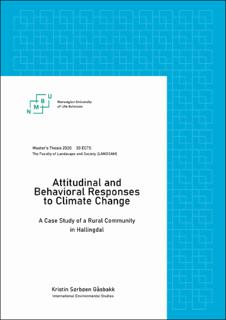| dc.description.abstract | Climate change is the greatest environmental problem of our time, which is exponential in rate and globally significant in magnitude. There is scientific consensus that the current and abrupt changes in the climate are extremely likely to be driven by greenhouse gas emitting activities and human behaviors. Reduction of greenhouse gases demands therefore large attitudinal and behavioral changes among individuals across the whole globe. Furthermore, this study takes place in a Norwegian context and will discuss rural people’s attitudinal and behavioral responses to climate change. Today, there is not much research about this topic in a rural context, but there are indications that rural people may be less concerned about climate change and less willing to contribute to reduce their emissions, which I will investigate further.
Moreover, this thesis aims to answer the questions: 1. What are the major differences between rural and urban communities in Norway, in terms of climate-related attitudes and actions? 2. How do the locals in Ål municipality perceive and act regarding climate change? 3. What role does people’s identity play for how they think and act considering climate change? By exploring these questions, my research strategy is to conduct a case study of a rural community in Hallingdal, where I use mixed methods to collect and analyze the data. I use quantitative research in terms of statistical analysis of primary data of CICERO’s survey to answer RQ1 and qualitative research in terms of in-depth interviews to investigate the climate-related perceptions, attitudes and actions among the locals in Ål, in order to answer RQs 2 and 3.
I recognize that the findings cannot be generalized to other cases or populations, but it can provide a better understanding of how rural people think and act considering climate change. The results show that rural people are less concerned about climate change compared to urban people. However, the majority of the respondents in Ål believe in anthropogenic climate change and endorse biospheric values, but this study shows a tendency to a more climate-negative youth (18-29 years) compared to people between 45-59 years. Besides, the locals are dependent on the car and lack access to public transportation, which is the same tendency at a national level. Holiday trips have a big importance to the majority, but many also feel a discomfort when they travel with plane. Several of them do not eat meat or have reduced their meat consumption, but in general, meat is an integral part of the village’s food culture and social culture. In addition, their identities seem to play an influencing role in several ways, such as how person identity influences what decisions they make regarding electric car purchases or flight travels, or how social and role identities affect how they view meat production and plantbased products. | en_US |

